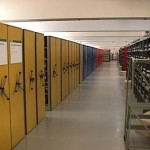 My mom’s visiting this week, and she brought more papers and objects from the archive, also known as her garage. And though I haven’t even finished writing about my dad’s manuscript, I’ve got a whole new set of documents to feed the book project. A letter from his chess-playing friend, along with a sheaf of computer chess score sheets. My dad’s old 5-year diary, from the early-to-mid 1950s. The diary itself will take a while: each whole day compressed into about an inch of space. Each page has five years of the same day. In some ways it reminds me of a Twitter feed, a Facebook status update. Perhaps the technology of documenting our days isn’t so different.
My mom’s visiting this week, and she brought more papers and objects from the archive, also known as her garage. And though I haven’t even finished writing about my dad’s manuscript, I’ve got a whole new set of documents to feed the book project. A letter from his chess-playing friend, along with a sheaf of computer chess score sheets. My dad’s old 5-year diary, from the early-to-mid 1950s. The diary itself will take a while: each whole day compressed into about an inch of space. Each page has five years of the same day. In some ways it reminds me of a Twitter feed, a Facebook status update. Perhaps the technology of documenting our days isn’t so different.
There are difficult documents in this batch: a copy of my dad’s death certificate, which means that I can now request his military records. A copy of the first and last Father’s Day poem that I wrote for my dad; he died in June. Hard. And harder still: the poem’s folded inside a copy of the eulogy that my uncle delivered at the funeral. A small gift from the eulogy: according to my uncle, my dad was conscious enough to read my poem before he died.
These are papers that I haven’t seen in years, if at all.
I’ve been thinking about my family archives: all those garages, all those places where we’ve kept paper traces of our lives. I’ve got my own archive growing a life of its own in my basement. “Nimuras,” my grandfather once mused, with some disgust, “are notorious pack rats.” What if we took that pack-rat tendency into historical ventolin inhaler usa context, with the Depression, with the dispossession of internment? (And, yes: am I just excusing our love for clutter?) I wonder how long it takes my family to go back through those boxes, if at all.
In fact, a couple of nights ago, I woke up wondering about my own pack-rat tendency to keep everything, but rarely look back at it all. Why has it taken me so long to begin this book project, to go back through the family archive? The metaphor may be too obvious: put everything into a box, and imagine that the keeping will be enough. But as most historians and librarians would probably tell you, an archive’s almost no good until somebody processes it, makes sense of it, organizes it. The literary critic in me would add: and makes it into narrative.
Can memory work the same way as archives? Can you bury memories desperately, leave them untouched for years, and return to them intact? And if not, is this one reason why we need physical archives?
What draws me back to this archive, this set of memories about my dad, is something I can only describe as an insistent tug. I don’t think that nostalgia is drawing me back, if nostalgia means the desire to look back, relive, find pleasure in the bittersweetness of the loss.
It’s more like the reason you might press a bruise. Yes, that’s still there. Yes, it still hurts. But maybe your fingers want to return to that mark, precisely because it’s a visible sign that you have hit something hard and survived. You press it, and wonder if it’s healed yet.

Your post is beautiful, Tamiko. I remember your cosy apartment near the lake…and how you liked to keep things then. I like your sense that the box of “stuff” doesn’t take on meaning until you’ve made it into a narrative of some kind. I’m excited you’re working on this project and look forward to reading it. You’re doing amazing things!
Thanks for reading, and commenting, Max! So sweet. It’s so nice to hear from you in particular, and from the ether: just great to know that someone’s reading. XO.